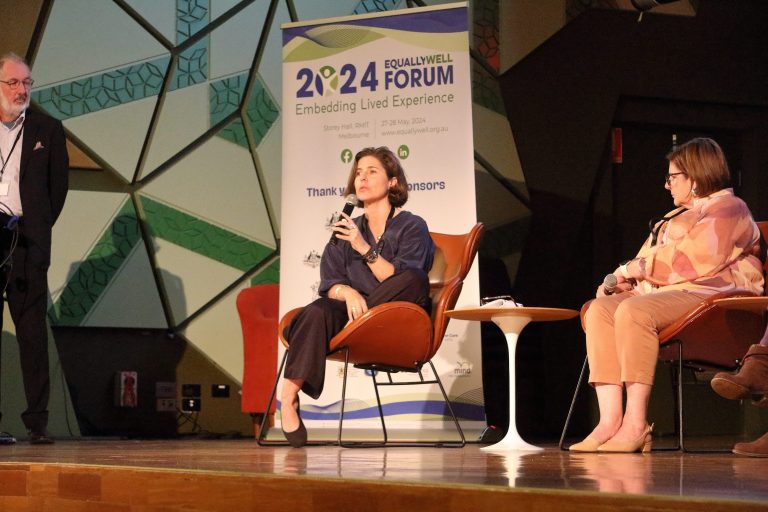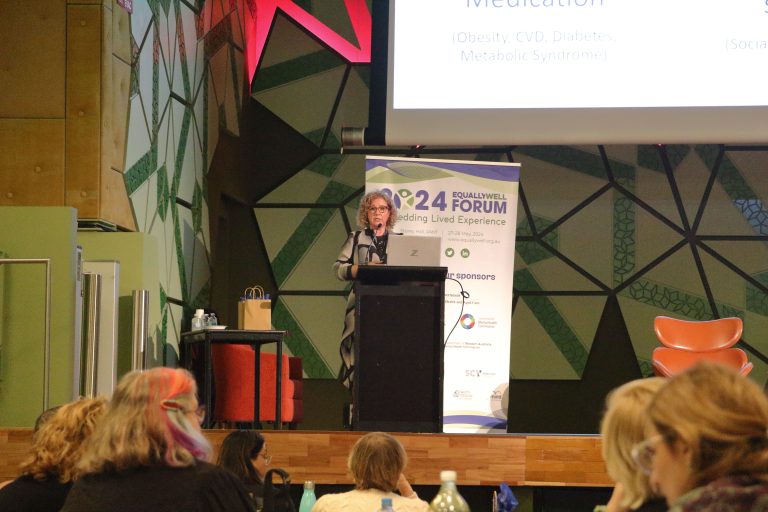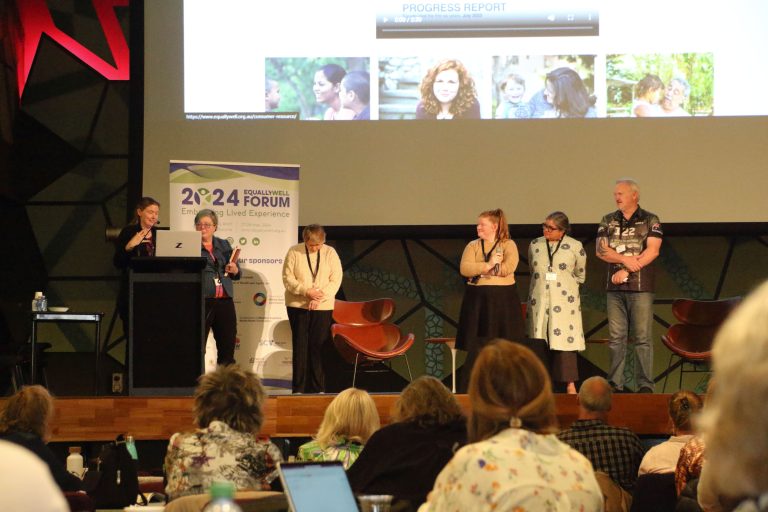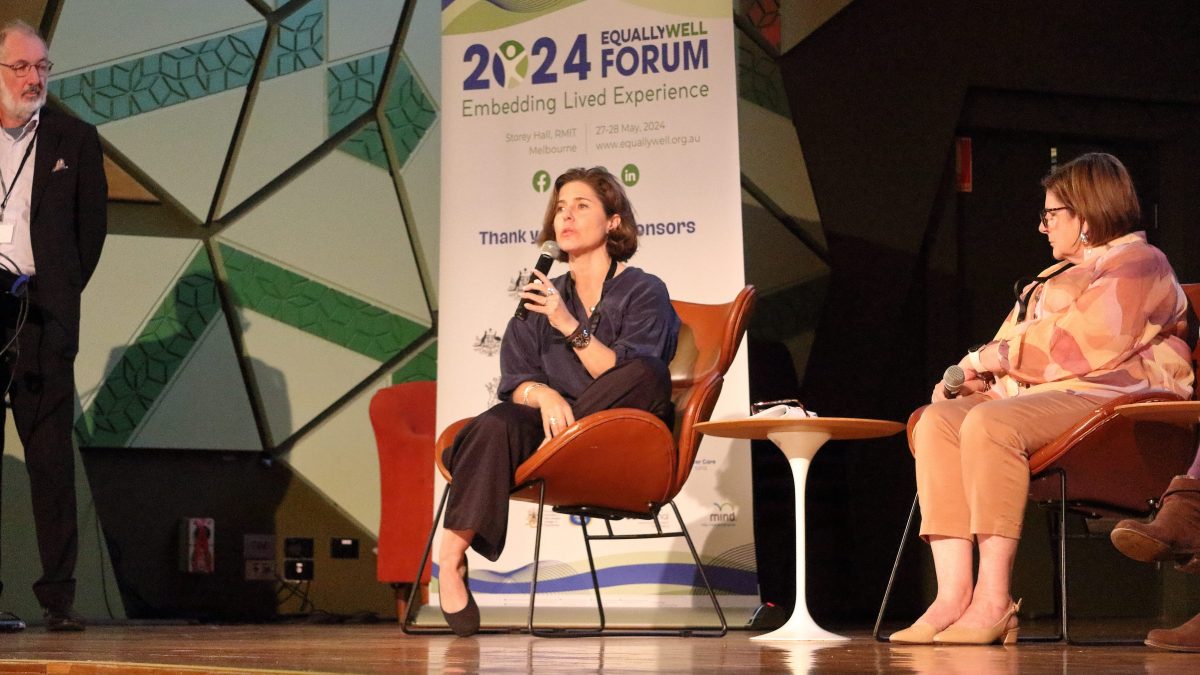Our Equally Well Forum Correspondent Justin Chapman shares his highlights from the 2 days of presentations, launches and workshops at the 2024 Equally Well Forum: Embedding Lived Experience, Storey Hall, RMIT, Melbourne.
You can watch all of the presentations from the two day event on the Equally Well website which will be updated very soon.
Day one
This year’s event was different from the usual Equally Well Symposiums we’ve come to know and love. While the annual symposium usually showcases the latest and greatest developments in improving the physical health of people with mental health issues, this year’s Forum is focusing on embedding lived experience in that mission.
Opening
The Equally Well Co-Chair Dave Peters opened by greeting the packed auditorium. This year we had the opportunity to contribute to a collectively developed Call for Action, that will be used for advocating for change toward the Equally Well mission. In her Opening address Victorian Minister for Mental Health, Ingrid Stitt highlighted the Government’s priorities for addressing the physical health gaps stemming from the Royal Commission into Victoria’s Mental Health System, two important points: (1) services need better integration, and (2) people with lived experience and their family and carers need to be central in the design and delivery of services.
Consumer Resource launched
Participants were encouraged and inspired by the launch of the codesigned Consumer Resource which is now available on the Equally Well website. The resource supports people to have tailored conversations with their doctors about their physical health needs and fills a gap by being person-focused rather than being a ‘tick and flick’ tool. One of the codesign members explained how their role as a peer support worker was often focused on supporting consumers to make the most of their time with health professionals, and that this resource will “help people remember what to say and be in the driver’s seat with their recovery”. Representatives of the codesign working group Chris Maylea, Tessa Zirnsak, Judith Drake, Mel Sherrin, Lyn English, Michael Burge and Amrita Dasvarma gave an excellent demonstration of the online resource and shared their personal stories in a well received presentation.
Unequally Unwell Data report launched
The next output was launched by Russell Roberts, the National Director of Equally Well. Equally Well is about health equity and improving quality of life of people with mental health issues, but sometimes we just need the bare facts about the health gap experienced by people with mental health issues to drive that message home.
Entitled “Unequally Unwell”, the new report is on the early mortality experienced by people with mental health issues. The report draws on national datasets covering 24 million Australians during 2016-2017, over 5 million of whom accessed mental health-related treatments (including services and medications). About half of all deaths during the period were people who accessed mental health-related treatments, which is striking given that they made up less than a quarter of the Australian population. What’s most alarming about these figures is that about 3 out of 5 of the deaths were potentially preventable, had they only received equitable access to quality healthcare on par with the rest of the population. Read all the facts about detailed in the report on the Equally Well website.
No grassroots movement has ever instigated change by only talking about the positives, and highlighting the health disparity can generate an urgency for change and lead to broader community action.
Workshops continue the conversation
As usual for Equally Well events, there’s much more content than what can be covered in one room, so we broke off into four different workshops. Each workshop included facilitators tasked with extracting ideas from participants to form the proposed Call to Action.
The workshop facilitators returned to present their findings to the Forum. Views expressed in the workshops relate to what’s needed for change in the sector; some key take-home messages included:
• Whole of community approaches and building activity and community exposure into everyday interaction with services. Embedding peer workers in GP practices. People need choices that aren’t hospital based.
• Establishing systems to equalise the power, starting with education of future practitioners. Supported decision making tools could help improve communication in simple but respectful language.
• Training of health professionals to support whole-of-person care; taking biopsychosocial, spiritual and cultural approach to focus on wellbeing.
• Peer navigation models and supporting peer workers to engage fully with consumers about physical health.
• Valuing contributions and creating a safe space for sharing and learning from all perspectives. Flexibility of models and being agile to accommodate for people’s needs and communication requirements.
• We need to be equally powerful and equally brave. Discussion about the challenges of ensuring equal power and balancing opposing views. Equalising and reclaiming power sharing given that the system is invested in the status quo.
Panel discussion
In the afternoon we were joined by a superstar panel of lived experience experts, namely Catherine O’Donnell, De Backman-Hoyle, Shannon Harwood and Kathy Wilson. Equally Well Alliance Co-Chair John Allan took the stage for the first time to Chair the panel, which was about Embedding lived experience: goals and aspirations.
John posed the question: What do you see in the future over the next five years for lived experience and improving physical health?
Shannon: In Tasmania there’s an interest in metabolic health screening and treatment. In five years time, I don’t see a divide between body and mind in the same way that there is now. I see metabolic intervention is a mental health intervention.
Catherine: More holistic lifestyle support. I worked as the first peer worker in the Keeping the Body in Mind program sitting in a clinical team supporting healthy lifestyle programs. My passion is bringing lived experience leadership into the workforce.
Kathy: In five years, no-one is sharing power with us – no-one is holding power over us so much that it needs to be shared with us. The power sharing story is what we’re up to now, but it needs to shift. I was previously a CEO with a mental health history that I kept secret, but in future, people should be no longer be afraid to claim their lived experience.
De: We need to genuinely infiltrate the hearts and minds of people who make decisions on behalf of other people. We have to be in places of power to influence decisions – “in the tent” so to speak. It’s hard work and it can be difficult to be taken seriously, but it can be very powerful when you get respected as a peer advocate.
A personal journey
In the final session for the day the Mental Health Commissioner for South Australia, Taimi Allan, gave a presentation entitled “From preaching to the converted to driving real change”. Taimi has diverse skills and interests, including glass blowing, gin distilling, and a passion for social justice. Taimi provided some examples from her personal journey, recounting situations in which her symptoms of psychosis were being caused by thyroid problems that were only checked when a friend suggested it. Her experience was that treatment decisions were dependent on what was read on the medical chart, and the subsequent assumptions that were made rather than any collaborative approach.
“If we don’t have good human rights frameworks and laws, it’s difficult to ‘come out’ as having lived experience. There’s substantial inequity in the system, diagnostic overshadowing is rife”.
A GP perspective
Equally Well Ambassador and Lifestyle Medicine GP Dr Sam Manger, spoke of challenges with an autoimmune disease in his teens and discovering his own autonomy in managing symptoms using lifestyle practices. Experiencing challenges during his medical training he sought mental health support and recognises the centrality of patient autonomy in therapeutic relationships.
But he also acknowledged that while some GP’s can do better, the primary care sector is under strain. People are presenting with more complex conditions, and 41% of doctors having depression and anxiety, and 71% of GPs reporting symptoms of burnout. Sam said that humility is a key factor for health professionals:
“The days of the all-knowing doctor are gone; we need to replace with a shared journey where each member contributes. GPs are needing a more individualised approach, hearing people and listening with curiosity and humility. Health professionals have relied too much on logic rather than stories.”





